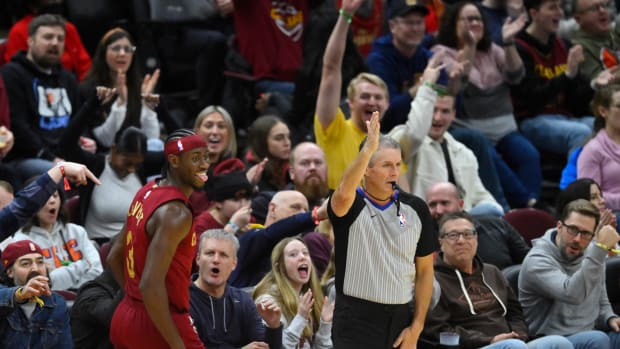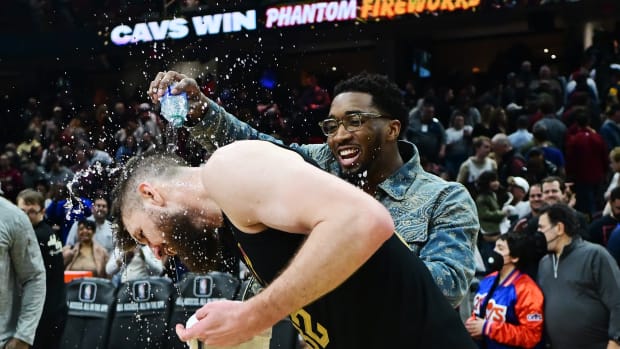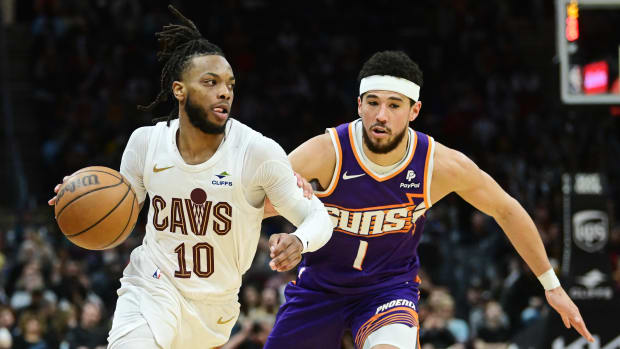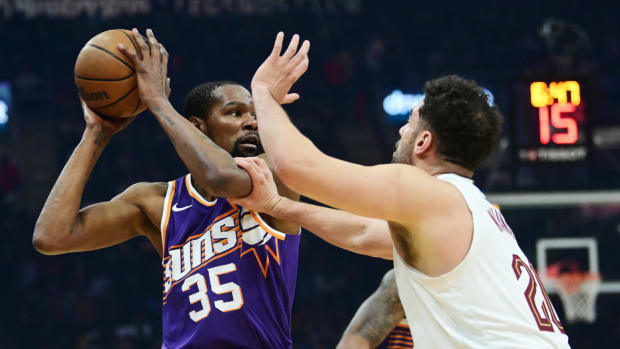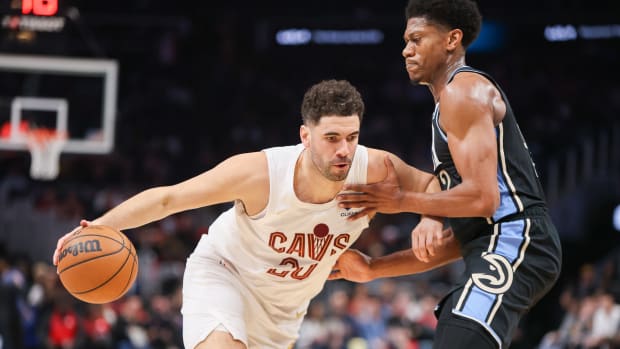Morrow: What to expect from new-look Jazz
This offseason for the Utah Jazz, there's been a lot of roster turnover. Anytime that you lose two of your three most important players, your team is going to look significantly different. So, here are a few things that to expect to see from the Jazz next season:
A Different Offense
The Jazz's offense is going to be different. It's going to be worse. That's to be expected given the talent that they lost. Gordon Hayward was the team's go-to guy. He was their leading scorer (21.9 points per game) and second-leading assister (3.5 per game). George Hill (16.9 points per game) was their second-leading scorer and leading assist man (4.2 per game)... and he's gone too. Hayward was clearly their most important player on offense. Hill was probably second.
The Jazz's offense last season was already predicated on off-ball movement. Even Hayward, their leading scorer, only ran 1.5 isolation possessions per game and barely ranked top-30 among qualified NBA players in usage last season.
Without Hayward, the Jazz don't really have a star to whom they can give the ball and ask for a bucket. Joe Johnson sort of qualifies, but you don't want to have to rely on a 36-year-old guard in crunch-time situations throughout the year.
Usually, a good coach plus no (or few) go-to scorer equals an egalitarian offense with lots of motion. If the Jazz had kept Hill, the offense would've been almost solely motion-based. Instead, they traded for Ricky Rubio. Rubio is most effective with the ball in his hands. We know what Rubio is at this point; he's one of the best passers in basketball and a great defender, but his inability to consistently shoot from outside keeps him from being a star.
The pick-and-rolls that Rubio will run with Rudy Gobert are going to be a lot of fun; Gobert was in the 95th percentile last season as a roll man, and Rubio is a much more creative passer than anybody that the Jazz had running the pick-and-roll last season. Rubio will be able to penetrate and find Gobert up top for lobs or kick it out to shooters (Joe Ingles, Rodney Hood). Rubio probably isn't a better overall basketball player than George Hill, but he may be a better fit for the Jazz now that Hayward is gone; someone has to handle the ball, and Hill, an off-ball guy, makes less sense with Hayward being replaced by Ingles in the starting lineup.
This will still be an offense with a lot of movement and, ideally, spacing. The reason behind the word "ideally" is that the Jazz don't have enough shooting for a modern-day offense in their projected starting five. Speaking of...
Derrick Favors Will Be Shopped or Lose His Starting Spot
Derrick Favors no longer makes sense for the Utah Jazz. Even if he can get and stay healthy, he simply isn't the right fit. In today's NBA, going up against teams like the Rockets and Warriors, a team that starts three non-shooters isn't going to be competitive. Favors is a good player, but in this case, fit is more important than talent. He made some sense with George Hill as starting point guard, but having all three of Rubio, Favors and Gobert on the court together is spacing suicide (all due respect to Hood and Ingles, but you need more than two shooters).
A stretch-four makes just makes way more sense on a team with non-shooters at both point guard and center. They could always just start Trey Lyl– oh wait, he's gone... is Jonas Jerebko their starting four once it becomes clear that Favors isn't the right fit?
Favors' value isn't going to be super high; there isn't much demand for traditional bigs who can't shoot from beyond the arc, especially those with nagging injury concerns. Since they might not be able to get much for him, they could transition him into a sixth man role. Plenty of big men have found great success in spark-off-the-bench roles; see Enes Kanter and Greg Monroe.
Favors would likely be significantly more helpful to the Jazz in that sort of role, but I don't know whether his ego would allow him to accept that; Favors has been a starter since the 2013-14 season, and being relegated to the bench would definitely feel like a demotion, even if it's what's best for the team.
An Elite Defense (Still)
Last year, the Jazz had the third-best defense in the NBA (Spurs, Warriors). That isn't changing anytime soon. Point guards who are strong on the defensive end are somewhat rare in the NBA; offense is often deemed more important (see Isaiah Thomas, Kyrie Irving, Damian Lillard, and so on). Having a defensive-minded guard to throw at guys like Thomas, Irving and Stephen Curry is invaluable, though. The Jazz had an above-average defender at point last season in George Hill and managed to swap out Hill for an even better one in Ricky Rubio. Joe Ingles is a defensive downgrade from Hayward, but any defense with Rubio on the perimeter and Gobert protecting the rim is going to be a good one.
Rubio has never led the NBA in steals per game, although he frequently finds himself among the top five or 10 players in that category. Next season, he'll be able to afford to gamble on steals, as Gobert will be behind him protecting the rim. There's a very good chance that Rubio will lead the NBA in steals.
A Surplus of Guards
The Jazz will have a lot of guards if everyone's healthy (yikes, that's a big "if"). The projected starting backcourt will be comprised of Ricky Rubio and Rodney Hood. That leaves Dante Exum, Alec Burks, Donovan Mitchell and Raul Neto fighting for backup minutes. I'm not sure you can find minutes for all those guys. Hood can play some three, but he'll probably start at the two. Burks can slide to the three in spurts as well, but he's more of a two-guard. None of the rest of those players can play consistent minutes outside of the backcourt. These guys are going to have to fight for minutes. Rubio is an established NBA point guard, Hood is a good athlete with a great stroke from outside. Exum was drafted fifth in 2014, and while he hasn't had the greatest start to his pro career, he looked fantastic in this year's summer league. Then there's Donovan Mitchell, who also impressed in summer league, showing off his shooting range and bounce. These guys are going to have to compete for minutes amongst one another. It'll be interesting to see which of them earn consistent minutes.
A Breakout Season From Rodney Hood
With Gordon Hayward gone, somebody is due for a breakout year on the offensive end. That somebody is likely to be Rodney Hood. Hood seemed primed to break out last year, but knee issues kept him off the court intermittently.
When Hood has been healthy, he's a good athlete and has a very clean stroke from outside with range that extends beyond the three-point line. Hood shot a career-high 37.1 percent from deep last season. That's not a mind-blowing number, but it's solid, and Hood certainly doesn't exclusively take open looks; Hood isn't afraid to pull the trigger. He missed 23 games last season but still ranked 18th in the NBA in three-point makes, with 161. Plus, he's shown a penchant for hitting big shots late in games.
At 6-foot-8, Hood has great height for a guard. He didn't post up often last season (0.4 times per game) but ranked in the 92nd percentile among all players when he did.
Hood has a refined offensive game, and while he has yet to score at a highly efficient level, he does have the tools to do so down the road. Much of Hood's offensive game is very reminiscent of Bucks guard Khris Middleton, a player whom I wrote about as one of the NBA's most underrated players last season.
If Hood can stay healthy and develop into a player redolent of Middleton – especially in regards to his efficiency – that's a huge win for the Jazz. There's no guarantee that Hood breaks out, but if he doesn't, the Jazz's offense may struggle without a go-to scorer.
A Low Playoff Spot
Even after losing Hayward and Hill, the Jazz should make the playoffs this season. Rubio, Mitchell and (fingers crossed) good health should be enough to stop the bleeding. They probably won't be the fifth-seeded team that they were last season, though. They won't be as good, and the West got better. The Timberwolves added Jimmy Butler and Jeff Teague, the Nuggets signed Paul Millsap, the Thunder stole Paul George from the Pacers. Plus, teams like Portland (Jusuf Nurkic) and New Orleans (DeMarcus Cousins) will get full years from key midseason additions.
A seventh or eighth seed feels right for the Jazz, but if you told me that they'd miss the playoffs I wouldn't be shocked. All it takes is one or two key injuries, or one or two rival Western Conference teams being better than we expect.
All in all, the Jazz are going to be a mid-tier Western Conference team with a strong defense and a decent offense that will likely sputter at times. The fear for the Jazz is that they become a team in basketball purgatory; the middle of the conference isn't where a team wants to be.
